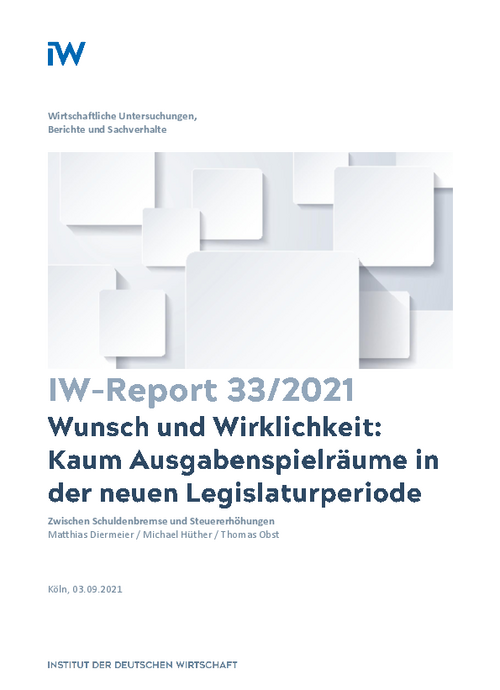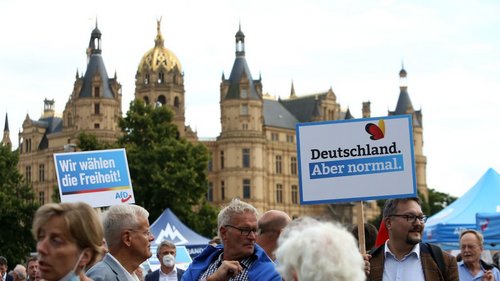The 2021 election campaign for the German Bundestag reveals various demands on the federal budget over the next years. In the coming legislative period, for example, the federal budget may have to finance the "mothers' pension", take over the EEG levy, compensate for an increase in the social security contribution rate above the predefined threshold of 40 per cent, forego the revenues from the remaining "solidarity surcharge" and shoulder a higher defence budget. Some potential coalition partners, however, reject a reform of the debt brake and at the same time even promise significant tax cuts.

Desire and reality: Hardly any scope for public spending in the new legislative period

The 2021 election campaign for the German Bundestag reveals various demands on the federal budget over the next years. In the coming legislative period, for example, the federal budget may have to finance the "mothers' pension", take over the EEG levy, compensate for an increase in the social security contribution rate above the predefined threshold of 40 per cent, forego the revenues from the remaining "solidarity surcharge" and shoulder a higher defence budget. Some potential coalition partners, however, reject a reform of the debt brake and at the same time even promise significant tax cuts.
The 2021 election campaign for the German Bundestag reveals various demands on the federal budget over the next years. In the coming legislative period, for example, the federal budget may have to finance the "mothers' pension", take over the EEG levy, compensate for an increase in the social security contribution rate above the predefined threshold of 40 per cent, forego the revenues from the remaining "solidarity surcharge" and shoulder a higher defence budget. Some potential coalition partners, however, reject a reform of the debt brake and at the same time even promise significant tax cuts.
Considering a ‘burden scenario’ for the coming legislative period shows, however, how much the implementation of individual policy proposals discussed during the election campaign would amount to. It appears like trying to ‘square the circle’ if the debt brake were to be maintained and taxes were not increased. The additional expenditure and/or revenue short-fall of the campaign promises shown in this paper alone will triple from 37 billion euros to 105.1 billion euros in the period 2022 to 2025. Even if urgent investment projects to mod-ernise the public infrastructure and to cope with climate change and the digital transfor-mation are left out of the equation, the result is a substantial finance gap worth billions of euros. With the debt brake maxed out, the financing of up to 263 billion euros by 2025 re-mains open. The existing scope for spending is therefore far from sufficient to close this financing gap. At the same time, the pressure on tax revenues is increasing: Whereas in times of balanced budgets before the outbreak of the pandemic, government spending amounted to 1.08 euros for every tax euro collected, spending would level off at a rate well above 1.40 euros if the spending targets were realised. The debt brake would then be breached.
Although it seems possible in principle to grow out of higher public debt in the long term at the low level of current interest rates, this would require an innovation-friendly and invest-ment-boosting policy, which is not to be found in any of the election programmes. At the same time, it will not be easy to repeat the successes in budget consolidation of the past decade due to positive employment effects and a sharp drop in interest expenditure. Grow-ing out of debt in line with the debt brake, considering the extensive demands on the future federal budget, would require a great deal from the dynamics of economic growth. In the absence of corresponding political consistency, utopian economic growth would be needed in the coming years to finance the emerging budget deficit with tax revenues. ‘Squaring the circle’ will not succeed.

Desire and reality: Hardly any scope for public spending in the new legislative period

More on the topic

Tailoring the Truth: evidence on parliamentarians’ responsiveness and misinformation toleration from a field experiment
The rise of populist radical right parties (PRRPs) is largely seen to have been triggered by a dealignment between voters and political elites and to have triggered an increasing supply of misinformation.
IW
Works Council Elections 2022: Results of the IW Works Council Election Survey
Works councils receive strong backing from the workforces they represent. Nevertheless, the drop in turnout reported in the IW Works Council Election Survey 2022 suggests that this support is declining.
IW